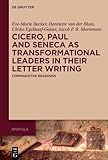Cicero, Paul and Seneca as Transformational Leaders in their Letter Writing : Comparative Readings / Eve-Marie Becker, Henriette van der Blom, Ulrike Egelhaaf-Gaiser, Jacob P.B. Mortensen.
Material type: TextSeries: Epistula – Studies on Ancient Letter Writing ; 2Publisher: Berlin ; Boston : De Gruyter, [2024]Copyright date: 2024Description: 1 online resource (X, 700 p.)Content type:
TextSeries: Epistula – Studies on Ancient Letter Writing ; 2Publisher: Berlin ; Boston : De Gruyter, [2024]Copyright date: 2024Description: 1 online resource (X, 700 p.)Content type: - 9783111388137
- 9783111438337
- 9783111438191
- 800
- online - DeGruyter
- Issued also in print.
| Item type | Current library | Call number | URL | Status | Notes | Barcode | |
|---|---|---|---|---|---|---|---|
 eBook
eBook
|
Biblioteca "Angelicum" Pont. Univ. S.Tommaso d'Aquino Nuvola online | online - DeGruyter (Browse shelf(Opens below)) | Online access | Not for loan (Accesso limitato) | Accesso per gli utenti autorizzati / Access for authorized users | (dgr)9783111438191 |
Frontmatter -- Preface: Short project description and acknowledgements -- Contents -- Chapter 1 Introduction into authors, letters, theory and methodology -- 1.0 Guide to readers -- 1.1 Letter writing and transformational leadership: Introduction to the comparative readings -- 1.2 Presentation of authors and letters: Cicero, Paul and Seneca as epistolary leaders -- 1.3 Theory and methodology -- Chapter 2 Texts and translations -- 2.1 Cicero -- 2.2 Paul -- 2.3 Seneca -- Chapter 3 Comparative readings -- 3.1 Cicero -- 3.2 Paul -- 3.3 Seneca -- Chapter 4 Conclusion and perspectives -- 4.1 Leadership profiles of Cicero, Paul and Seneca across letters and categories -- 4.2 Overall conclusion and comparison: Cicero, Paul and Seneca as transformational leaders in their letter writing -- Abbreviations -- Cumulative bibliography -- List of authors and contributors -- Index -- Table of contents (detailed)
restricted access online access with authorization star
http://purl.org/coar/access_right/c_16ec
This commentary offers the reader a set of letters (or letter parts) written by Cicero, Paul, and Seneca, which have been selected against the Transformational Leadership categories of ‘idealised influence’, ‘inspirational motivation’, ‘intellectual stimulation’, and ‘individualised consideration’. Chapter 1 offers introduction into authors and theory: all three letter writers are considered as ancient leadership figures composing leadership letters. The letters selected are presented in original text facing a translation (Chapter 2). Chapter 3 provides analysis and discussion of each letter, and aims to introduce the reader to the historical and literary contexts before reading the letter through the lenses of Transformational Leadership theory. Chapter 4 sums up the findings on each letter and each letter writer in light of Transformational Leadership and its categories. The volume is aimed at all those who are studying the function of ancient letter-writing – especially the letters of Cicero, Paul, or Seneca.
Issued also in print.
Mode of access: Internet via World Wide Web.
In English.
Description based on online resource; title from PDF title page (publisher's Web site, viewed 20. Nov 2024)


